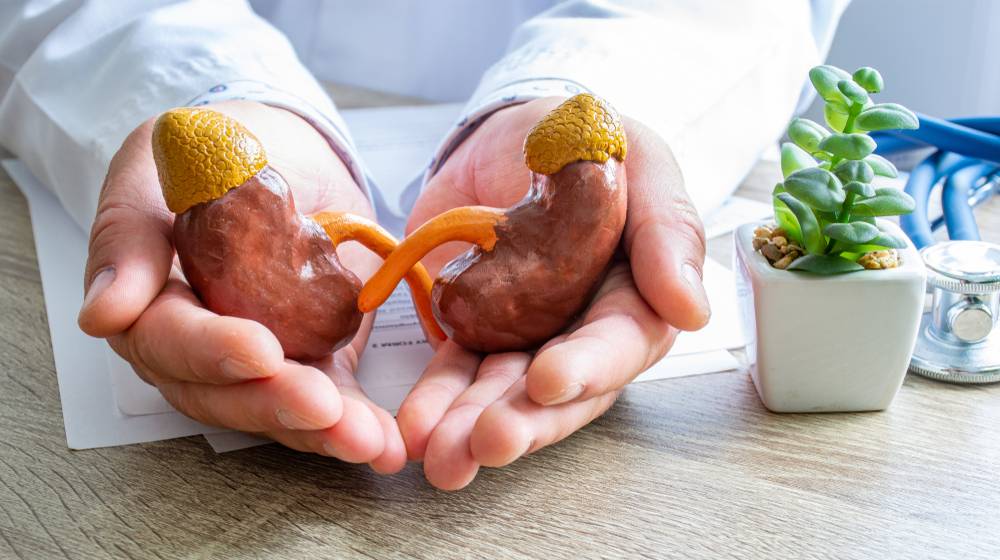Kidney Stones FAQs | How to Pass Kidney Stones Fast at Home
Do you know how to pass kidney stones fast at home? Are they hereditary? How do you get them? Let's talk about your most pressing concerns about kidney stones.
RELATED: FATTY LIVER: 5 Things You MUST Avoid
In this article:
- What Are Kidney Stones?
- How Do I Know if I Have Kidney Stones?
- What Are the Main Causes of Kidney Stones?
- What Is Kidney Stone Pain Like?
- How to Pass Kidney Stones Fast at Home
How to Pass Kidney Stones at Home and Things Your Doctor Wants You to Know
Click here to jump to the infographic
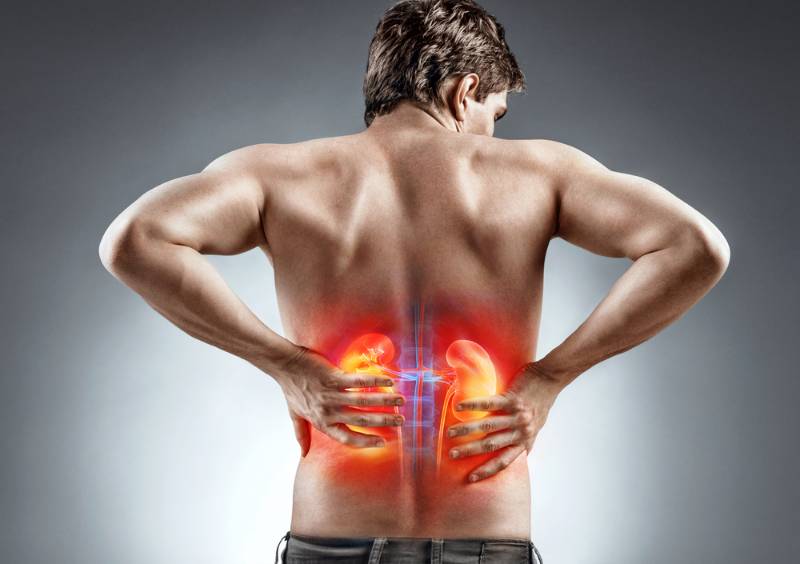
What Are Kidney Stones?
A kidney stone is a stone formed from minerals and salts from your urine.
It can be as small as a grain of sand or the size of a ping pong ball. But even small stones can be painful. Other times, you might not even know you have them.
You may need to have it surgically removed if:
- your kidney stone/s are too big
- your kidney stones are lodged in the ureter and cannot pass
- it is too painful to pass
- your kidney stones impair kidney function
How Do I Know if I Have Kidney Stones?
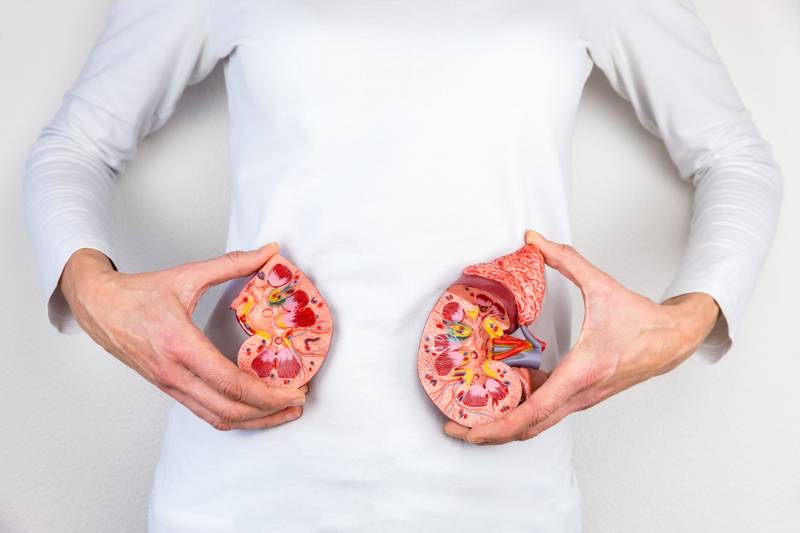
If kidney stones are small enough, you might not even know you had kidney stones. They may pass on their own through your urine, and the problem resolves itself.
These are called silent kidney stones, mostly spotted during X-rays in a physical exam.
But there are signs that you may have kidney stones:
- pain on your lower back or sides (the pain may subside, other times warrants a trip to the emergency room)
- nausea accompanied with the pain
- an intense need to urinate
- frequent need to urinate
- burning sensation while urinating
- reddish urine (a sign of some blood in your urine)
- smelly urine
- cloudy urine
For men, you might also feel some pain at the end of your penis.
Some of these symptoms are similar to a urinary tract infection (UTI). But if you feel any pain or notice unusual symptoms, let your doctor know.
What Are the Main Causes of Kidney Stones?
Knowing the causes of kidney stones may help prevent them. And for some, it may stop them from recurring.
1. Not Drinking Enough Water
When you do not drink enough water, there is less fluid to dissolve the stone-forming substances. When these become concentrated, it could lead to kidney stones.
Substances that might form into kidney stones include:
- calcium
- oxalate
- uric acid
- phosphate
- cystine (in rarer cases)
- xanthine (in rarer cases)
But no evidence says you need to go above and beyond your daily water requirements. Drinking more water than you need might not come with additional health benefits.
Staying hydrated may also help prevent and resolve kidney stones sans the operation table. But more on how to pass kidney stones at home later on.
If your urine is clear or you are rarely thirsty, you may be drinking enough water. A healthy, hydrated person might visit the bathroom six to eight times a day. Someone more active or living in a hot location might need more than that.
RELATED: Urine Color | 19 Mind-Blowing Secrets Your Urine is Revealing About You
2. Diet
A diet high in salt, oxalate, and animal proteins may cause kidney stones.
However, while calcium may form into kidney stones, lowering your intake might not reduce your risk of kidney stones. Instead, a high-salt diet can increase your risk of calcium kidney stones.
Calcium is an essential mineral for the body.
3. Obesity
Obesity may affect acid levels in your urine.
Highly acidic urine creates the ideal environment for uric acid and calcium kidney stones to form.
4. Some Conditions
Bowel conditions that involve diarrhea may raise your likelihood of kidney stones.
Diarrhea might dehydrate you, which may lead to kidney stones. It might also lead to high levels of oxalate in your body. And these two factors together may lead to calcium kidney stones.
5. Genetics
Having a parent or sibling with kidney stones may raise your risk factor.
It may be because some risk factors for kidney stones are genetic. Sharing the same diet or lifestyle could also explain why a family could have kidney stones.
6. Medications and Supplements
Some medications and supplements might lead to the formation of kidney stones.
Tell your doctor any medicine or herbal supplements you are taking. These could provide clues to the cause of your kidney stones.
What Is Kidney Stone Pain Like?
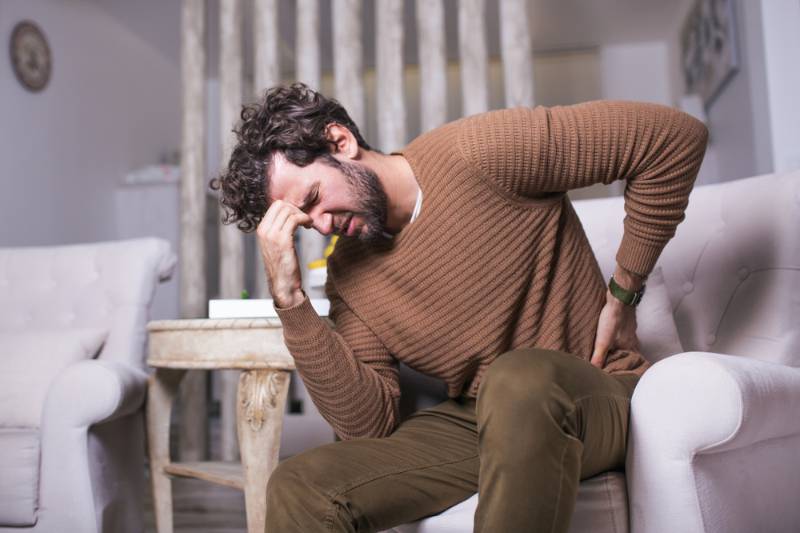
Kidney stones are sharp stones that could cause sharp, shooting pains. You may feel pain around your lower back or your sides. It could travel down to your abdomen and all the way to your groin.
And as you try to pass kidney stones, you might also feel them in your ureter. Men may feel pain at the tip of their penis.
The pain may come and go. Sometimes, it might be too much to bear and lead to a visit to the emergency room.
If you feel pain and experience a burning sensation when you urinate, visit your doctor.
How to Pass Kidney Stones Fast at Home

In most cases, kidney stones are small enough to resolve on their own. But where your health is concerned, it is best to treat it with proper care.
Here is how to pass kidney stones at home without hospital admission.
1. Drink Plenty of Water
Staying hydrated will dilute your urine and prevent stones from forming.
It is best to stick to water.
2. Keep Pain Relievers Handy
Even small kidney stones can be painful.
Having pain killers on hand might help ease you along the process.
Ask your doctor for a recommendation for pain relievers like ibuprofen or naproxen sodium.
3. Alpha-Blockers
Alpha-blockers relax your muscles and help kidney stones pass through your urinary tract smoothly.
It may also make the process faster and the experience less painful.
Your doctor might recommend an alpha-blocker like tamsulosin alone or in duet with dutasteride.
There are less invasive ways to treat kidney stones. Some treatments help break down kidney stones, making them easier to pass. Your urologist might also use a telescope to remove larger kidney stones.
Some might volunteer for surgery even if kidney stones are quite small. They might do this to avoid further complications down the road.
Here's an infographic guide that you can use. Feel free to download, save and share it with your loved ones: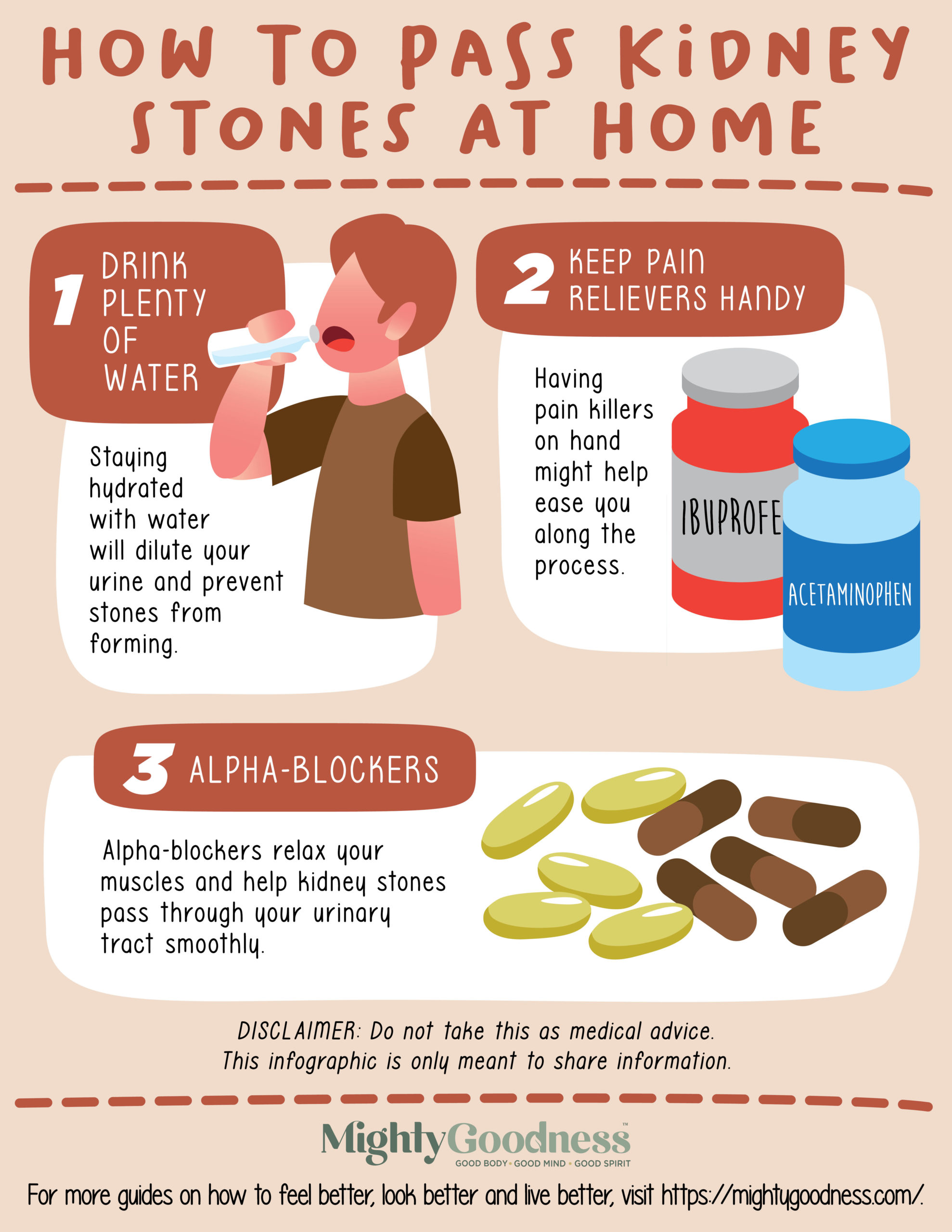
Check out this video to learn more about how to pass kidney stones at home:
Kidney stones are small but terrible. They are small pieces that could be as small as a grain of sand but still cause excruciating pain.
It is great to know how to pass kidneys stones at home. But prevention is better than cure.
You do not need to wait for a relative to be diagnosed with kidney stones before you take action.
Simple changes like a healthier diet and accompanying your meals with a healthy amount of water may help prevent kidney stones.
Did you know how to pass kidney stones at home? Or do you prefer to have your doctor assist you? Share your thoughts with us in the comment section below!
Up Next:
- Uric Acid Cleanse | How to Reduce Your Uric Acid Naturally
- How to Improve Kidney Function in Elderly
- Best At Home Testosterone Test and When to Consider Taking The Test
If you’ve got the gift of keeping healthy and sharing this knowledge through writing, click here if you want to write for us.
Please stay connected with us on Facebook, Pinterest, Instagram, and Twitter. Join our community here and Feel Better, Look Better and Live better with us.
Trending
Get Updates
SIGN UP FOR OUR NEWSLETTER TODAY
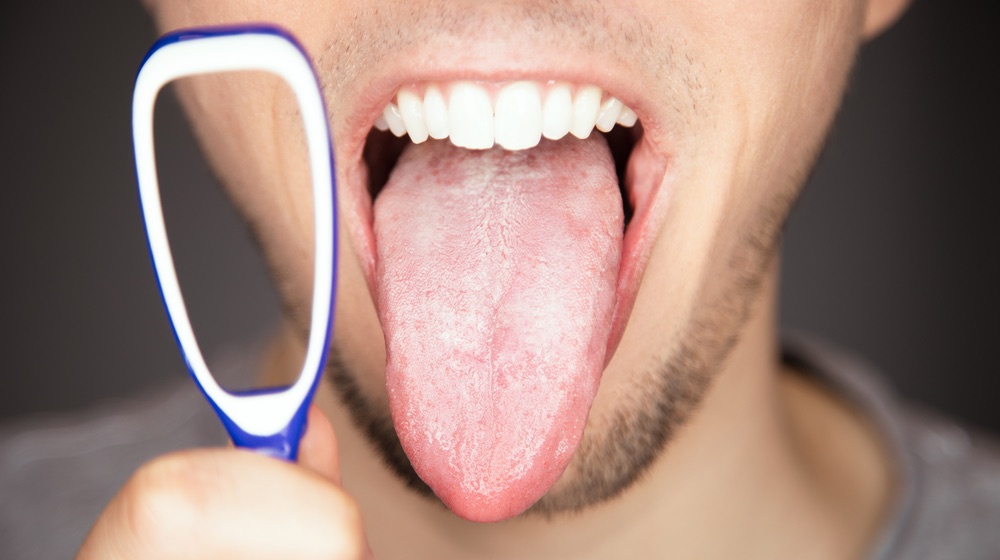
Tongue Color | 7 Scary Tongue Color Meanings
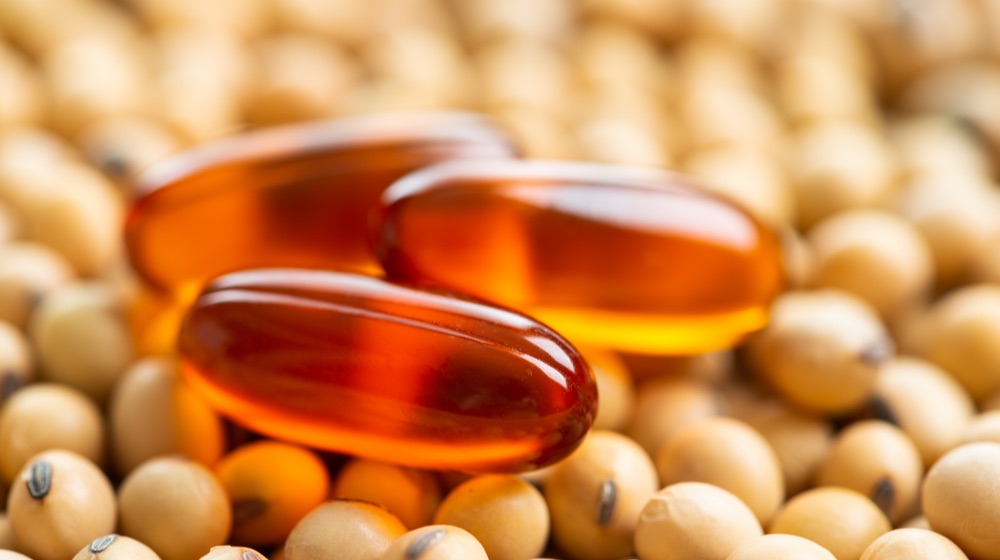
Lecithin Benefits and Side Effects: 10 Surprising Truths
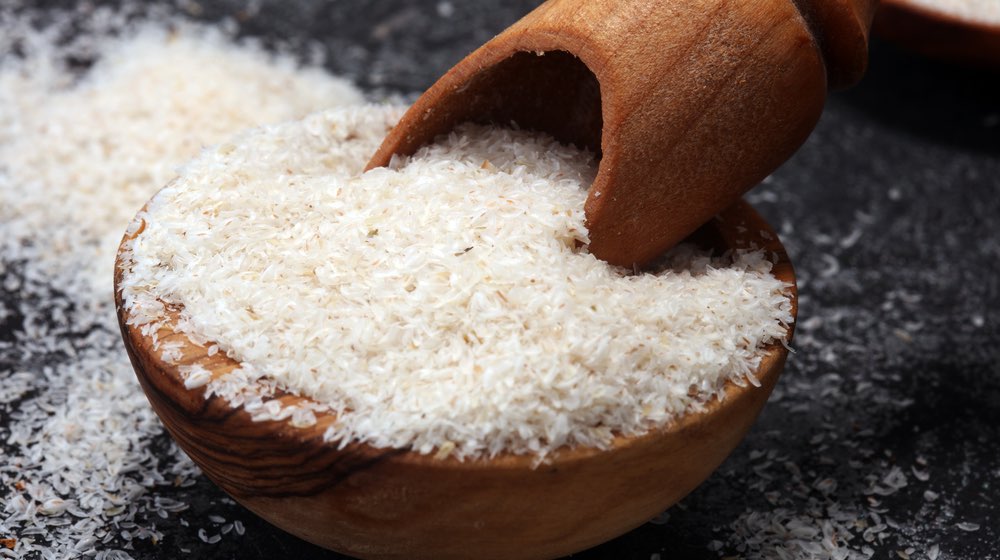
Related

Tongue Color | 7 Scary Tongue Color Meanings

